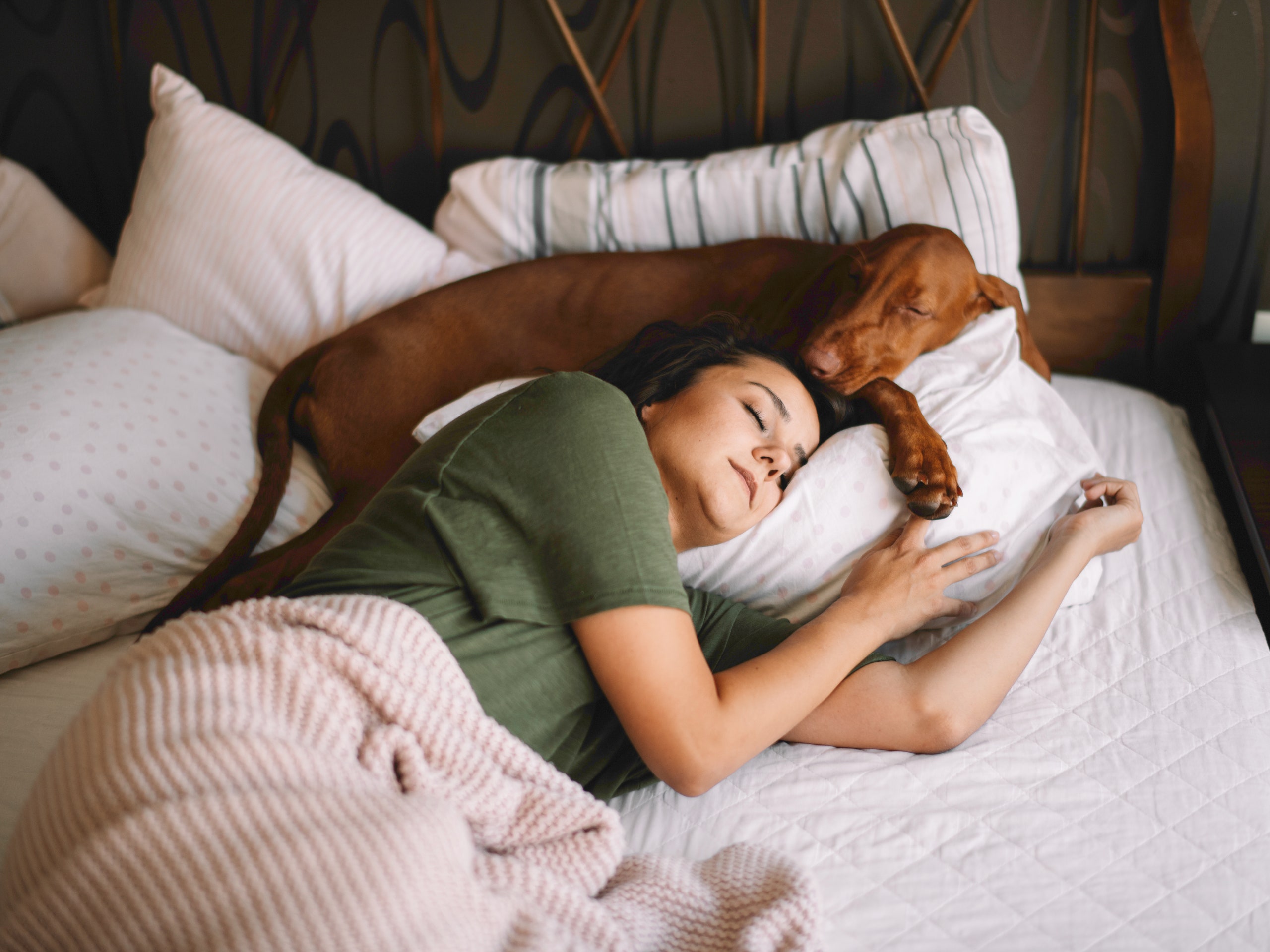When you’re sleeping badly, it doesn’t just ruin your night, it also ruins your day.
If you don’t get good sleep, your energy levels are depleted and overworked. You find yourself feeling irritable, foggy, and depressed.
Deep sleep is your body’s time to recharge and recover. Good sleep leaves your skin looking younger, your brain less cloudy, and your mood brighter.
Poor sleep is caused by several outside factors, such as your phone, diet, and alcohol intake.
Read on to learn more about what may be causing you to sleep badly so you can make the necessary lifestyle changes to improve your sleep.
Sleeping Badly? Here’s why.
Insufficient REM sleep, frequent awakenings, and problems dozing off are all symptoms of poor sleep.
If you’re not sleeping well, the effects can eke out into your daily life and create issues at home, work, and with your health.
Below, we discuss seven surprising factors that stop you from being able to sleep better at night.
#1 – Do the foods I eat affect my sleep quality?

The types of foods you eat both help your sleep and prohibit it.
For example, studies show that a high-fat diet leads to shorter sleep cycles and frequent awakenings.
What’s more, too many sugary foods make falling asleep harder because they energize you.
Caffeine can also be a problem. Depending on your disposition, caffeine intake three to six hours before bed can disrupt normal sleep patterns. This includes beverages like coffee, sodas, and green tea.
Luckily, making small changes to your daily nutrition can have a significant impact on your quality of shut-eye.
Try not to snack before bed, but if you need to, consider these options.
If you have a sweet tooth, choose items with natural sucrose over saccharin-like products, such as Sweet N’ Low or stevia. Artificial sugar stimulates brain activity and leads to insomnia.
Another trick is to try a natural sleep remedy, such as chamomile tea at least 2 hours before bed.
Curb carb cravings with any of these sleep-promoting snacks:
- Olives
- Kiwi
- Papaya
- Walnuts
- Wholegrain cereal
- Dark chocolate (only a small amount — large amounts produce too much caffeine)
#2 – Will a consistent sleep schedule help me sleep better?

Maintaining a consistent sleep schedule throughout the week will help you rest better. This means sticking to (relatively) the same waking and sleep times every day — even the weekends.
Otherwise, you run the risk of poor health.
A recent study found that people with fluctuating sleep durations and irregular bed- and wake-times are at risk for obesity, high cholesterol, high blood pressure, and high blood sugar.
What’s more, a poor sleep schedule can lead to Circadian Rhythm Disorder. This throws your natural body clock out of whack. This, subsequently, disrupts all of the vital rejuvenation processes that happen during the night.
Try these steps to maintain a regular sleep schedule:
- Set alarms to alert you to when you should go to bed and wake-up.
- Create a relaxing bedtime routine, such as meditation, soothing music, or reading.
- Make your bedroom as dark as possible to avoid light disturbances.
- If you are a “light sleeper,” use earplugs to block out any noise.
#3 – Is drinking alcohol causing my sleep issues?

If you drink alcohol to help you fall asleep, you may not be getting the restorative snooze that you need.
Alcohol is a depressant that slows your reflexes and heart rate. For many, this creates a feeling of drowsiness.
While a nightly glass of wine may help put you to sleep, it does not keep you there.
Alcohol consumption has been associated with a greater likelihood of Rapid Eye Movement Disorder. This means you are unable to maintain restorative REM sleep during the night.
Drinking alcohol may even increase your chance of developing sleep apnea. This is because alcohol relaxes your throat muscles, which restricts your breathing while you sleep.
If you are worried that your alcohol consumption may be causing bad sleep, try abstaining for a week and see if it improves. If you are still sleeping badly, contact your doctor.
#4 – Will intense exercise before bed make me sleep badly?

Light to moderate exercise before bed does not have a negative effect on sleep, but intense exercise will.
According to Christina Spengler, Head of the Exercise Physiology Lab in Zurich,
“As a rule of thumb, vigorous training is defined as training in which a person is unable to talk. Moderate training is physical activity of an intensity high enough that a person would no longer be able to sing, but they could speak.”
Intense exercise before bed raises your heart rate and body temperature. This floods you with energy, making it harder to sleep.
Try to refrain from intense exercise at least one hour before bed.
However, while intense exercise at night may delay sleep, other levels of physical activity help it.
Researchers have determined that moderate exercise within four hours of sleep time improves rest.
When working out at night, try a mild exercise such as yoga or Pilates.
To prevent overstimulation, add post-workout meditative relaxation techniques to your bedtime routine. This calms your brain waves and prepares you for sleep.
#5 – Does smoking affect my sleep patterns?
Smoking affects sleep patterns, but not in all the ways you might expect.
Nicotine is a stimulant, and the more often you smoke, the more likely your sleep will suffer.
The time of day that you smoke also affects your sleep. Research shows that night smokers are more dependent on nicotine, and wake-up more frequently due to cravings.
The constant nicotine buzz in smokers tricks the mind into not knowing when it’s tired, alert, or overworked.
Smoking also affects sleep in other ways. It raises your blood pressure and your heart rate, keeping you awake.
Smoking also increases your risk of developing sleep apnea.
But, if you’re thinking of quitting cold turkey, you may find that this will create sleep problems as insomnia is a common symptom of withdrawal.
Instead, experts advise cutting back to gradually removing smoking from your routine.
#6 – Is my lack of sleep due to excess screen time?

Time spent on your phone, laptop, or watching TV has a negative impact on your sleep.
According to Dr. Laurie Hollman, this is because “[y]our brain’s electrical activity increases, neurons race and divert you from calming down into a peaceful state of mind for sleep.”
If answering an email or text induces anxiety, this will release the stress hormone, cortisol, which is an adversary to sleep.
You may have also heard of the negative effects of blue light.
Blue light from your electronic devices tricks your brain into thinking it is daylight. This delays the release of the melatonin needed to regulate your sleep cycle.
To help yourself sleep better, limit your screen time before bed. Sleep experts suggest putting your phone away two to three hours before bedtime.
Exposure to bright, white lights (such as sunlight) throughout the day will also help you sleep better at night.
#7 – Is my mental health causing sleep deprivation?

Your sleep and mental health are intricately connected.
Not getting enough sleep can cause you to feel irritable, anxious, and depressed.
Likewise, feelings of depression and anxiety can cause you to sleep badly.
Health professionals state that adults with diagnosed mental health conditions are 50-80% more likely to suffer from insomnia or periodic awakenings than the general population.
The disorders that are particularly prone to sleep issues are depression, anxiety, bipolar disorder, and ADHD.
Doctors are often hesitant to diagnose mental health conditions in people who report sleep issues because it can be difficult to determine which came first.
Some helpful solutions include an increase in exercise, reducing your caffeine, nicotine, and alcohol consumption, or adding meditation to your bedtime routine.
One good sleep hygiene practice is to only use your bedroom for sleep and sex.
If you believe your poor sleep is due to your mental health, consult a healthcare professional.
In Conclusion
Knowing why you are sleeping badly is the first step towards a better night’s rest.
If your nights are sleepless, try changing up your bedtime routine with a soothing cup of herbal tea. If your late-night workout session is causing you to be too alert in bed, add a relaxing session of yoga and meditation to the end of your circuit.
If you still feel at a loss, consider one of these natural remedies for falling asleep quickly.
Whatever is causing your poor slumber, know that there are many ways to start getting good, restorative shut-eye now.

Welcome to Snoozerville! I’m Dr. Alex Hartley, your guide to the world of restful sleep. With a Ph.D. in Sleep Science and years of experience as a sleep therapist, I’ve dedicated my life to understanding and improving sleep quality. My passion lies in uncovering the mysteries of sleep and sharing practical, science-backed advice to help you achieve the best rest possible. Beyond my academic pursuits, I’m an advocate for mindfulness and relaxation techniques, which I incorporate into my daily routine. At Snoozerville, I aim to transform your nights, combining the latest research with easy-to-implement tips. Whether you’re a chronic insomniac or just looking to improve your sleep hygiene, join me on this journey towards peaceful, rejuvenating sleep.

